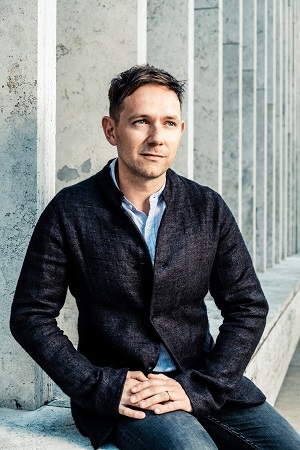I struggle to think of a performance that might embody the spirit and
practice of Gluck’s ‘reform’ aesthetic, as expressed in the composer’s 1767
Preface to Alceste, more pertinently and potently than Iestyn
Davies’ rendition of ‘Che farò senza Euridice!’, as enjoyed during this
performance of Gluck’s 1762 Orfeo ed Euridice at St John’s Smith
Square with La Nuova Music - bringing to a close the opening weekend of the
London Festival of the Baroque Music 2018
.
Beautifully direct and dignified, in ‘Che farò’ Davies’s powerful,
penetrating but also patrician countertenor was imbued with a perfect
balance of tonal purity and expressive colour. As from the Underworld Orfeo
pleaded with the Heavens for answers to his dilemma - how to live without
his beloved - Davies’ unearthly clarity evoked the supernatural and
delicate, even while it rang so resonantly. I was reminded of Michael
Tippett’s comment when he heard Alfred Deller sing for the first time, in
1944, that ‘felt the centuries roll back’. For there was timelessness and
otherworldliness here.
So much depends upon the singer’s ability, in this oddly major-key aria, to
elide love and loss, with the simultaneity of poetry, as joy and grief,
present miseries and past memories, are inextricably fused and sung. In the
Preface to Paride ed Elena (October 1770), responding to
criticisms of the aria’s apparent jolly tonality and ambience, Gluck noted
that, ‘Just the slightest change in the mode of expression is needed to
turn my aria ‘Che farò senza Euridice’ into a dance for marionettes [ un saltarello di burattini]. One note held longer or shorter, a
careless increase in tempo or the voice … may ruin a whole scene in a work
like this.’ Davies was the epitome of effortless meticulousness.
From the first, the searing cries, plummeting an octave - ‘Euridice!’ -
which puncture the opening chorus of mourning were heartrendingly
unswerving - packing an emotional hit where it hurts. This voice cried out
to be heard, by us and by the Gods. ‘Che puro ciel!’, sung in anticipation
of Euridice’s resurrection and arrival, featured beautiful cadential
ornamentation and trills, the perfect alliance of technique and expression.
In ‘Chiamo il mio ben così’ Davies descended into a chest register with
confidence and weight, enormously supplementing his characterisation of the
role. And, while in these arias, the sheer beauty of Davies’ sound was
entrancing, there was no lack of interest or striking impact in the lengthy
recitatives - in fact there was even more engaging modulation of tone and
phrase, fluidity of utterance, and naturalness of dramatic presence, as his
countertenor rang and rippled with rapture, indignation and despair.
Fortunately, Orfeo’s partners in the drama, Euridice and Amore, were no
less tellingly represented. Rebecca Bottone’s Amore was teasingly taut and
bright in her initial recitative exchanges with the stuttering, questioning
Orfeo, before Amore’s aria expressing faith in the fortitude of fidelity
glistened thrillingly. Sophie Bevan sent rich ripples of sound cascading
around the nave of St John’s, Smith Square; her shining expressivity warmed
us to Euridice’s passion, disbelief and confusion. And, after so much solo
singing, it was a delight to hear Davies and Bevan come together to assuage
the preceding desolation in duets of delight.
The opera is formed from paradoxes: a musical representation of the love
and loss from which opera sprang. And, as the setting sun shone into the
shadows of St Johns, Bates ensured that the music spoke of peaks of both
pleasure and pain. Characteristically animated, the conductor drew every
hue from Gluck’s score - colourful brass and expressive oboe playing in the
overture; a wonderfully paced interweaving of soothing harp and seething
Furies in Act 2; a dulcet flute solo in the ‘Dance of the Blessed Spirits’
(the one number imported from the 1774 Paris score) which had not a drop of
saccharinity; a beautiful airiness at the start of ‘Che puro ciel!’.
The Chorus produced a vibrant sound, by turns relaxed and wrought, warm
with bright hopefulness and darkly Hadean; the higher voices seemed to
dominate but this was countered by some lovely weightiness in the bass
regions of the orchestra, resulting in buoyant, balance and blend.
The final Act 3 ballet sequence was piquantly characterised, the movements
forming a compelling summary of discrete, individualised emotions as the
pace swept onwards. In fact, Bates probably did not need to work so hard!
He doesn’t conduct so much as gesticulate and ‘live’ the music - no bad
thing! - but given the quality of responsiveness of his fellow musicians,
perhaps not every musical gesture needs such emphatic physical
re-enactment. That said, it was a joy to watch Bates’s delightful coaxing
of uninhibited, extended thunder-blasts from the St John’s gallery!
If I had one small quibble, it would be to question why an interval was
deemed necessary, breaking Act 2 - as Orfeo descended in hopefulness to the
Underworld to rescue his beloved - after just 40 minutes.
Gluck’s Alceste Preface has asserted his belief that his opera
‘should achieve the same effect as lively colours and a well-balanced
contrast of light and shade on a very correct and well-disposed painting,
so animating the figures without altering their contours.’ And, this was
indeed a ‘chiaroscuro’ Orfeo in which Bates, La Nuova Musica and
the soloists, especially Davies, shone shafts of light which pierced the
darkness, leading to the arresting and exultant illumination of the opera’s
conclusion.
Claire Seymour
Gluck: Orfeo ed Euridice (Vienna edition, 1762)
Orfeo - Iestyn Davies, Sophie Bevan - Euridice, Amore - Rebecca Bottone; La
Nuova Musica - David Bates (director)
St John’s, Smith Square, London; Sunday 13th May 2018
